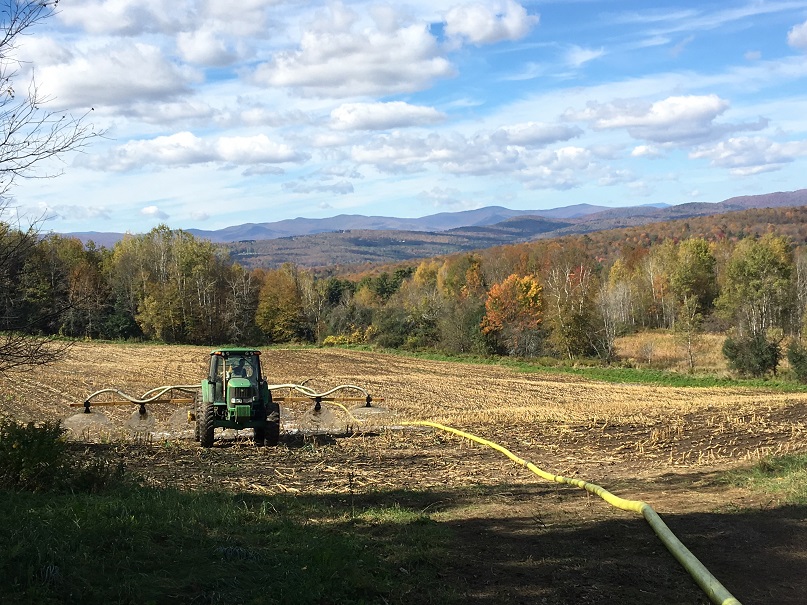
Governor signs Executive Order to Address Farm Flooding and Wet Weather Challenges
December 15, 2023 | Montpelier VT - The Vermont Agency of Agriculture, Food & Markets (VAAFM) would like to remind all farm operations that the annual winter manure spreading ban begins today, December 15th. VAAFM is aware that many Vermonters experienced unprecedented rainfall this summer, and these conditions reduced manure spreading opportunities and stressed manure storage capacity for farms. The winter manure spreading ban is still in place, but farmers can seek exemptions for emergency situations occurring because of the historic wet weather Vermont experienced in 2023.
Governor Phil Scott signed an executive order instructing VAAFM and the Agency of Natural Resources (ANR) to outline appropriate best management practices that enable farmers to spread excess manure while protecting the environment. Following that collaboration, VAAFM is prepared to issue exemptions to farms that request an emergency exemption and demonstrate a related need because of the Flood of 2023 and the related disastrous weather and field conditions. The Governor, VAAFM, and ANR understand that many farms lack sufficient storage capacity because of the persistent rain and flooding. Farmers’ shared commitment to protect the environment is important, and we recognize that farmers were often unable to responsibly access their fields to harvest crops or to spread manure while Vermont experienced record wet conditions this season.
Between December 15 and April 1, no manure or other agricultural nutrients (including compost and spoiled feed) may be spread on agricultural fields throughout Vermont unless an emergency exemption has been granted to an individual farm operation. This annual ban is required by the Required Agricultural Practices (RAPs), which is a part of Vermont’s overall strategy to protect water quality, the working landscape, and natural resources.
For more than 35 years, restrictions on winter manure spreading in Vermont have been in place to protect water quality. These restrictions have minimized spreading and potential runoff during winter, when field conditions may be particularly susceptible to it. The annual spreading ban requires farmers to either have a storage structure that can hold all agricultural manure and runoff that is required to be collected between December 15th to April 1st, which is 107 days, or they must be able to stack all manure produced in a way that meets RAP standards and will not lead to adverse water quality impacts. Years like this one, with natural disasters and severe weather conditions, can upend our standard restrictions and create the need for emergency exemptions.
Manure spreading is a common and widespread practice in Vermont agriculture, it enhances soil health and fertility for optimal crop production, plays a pivotal role in the nutrient cycle, and reduces imported nutrients. As crops grow, they require nutrients to mature into feed for livestock, which, in turn, provide bioavailable nutrients, or healthy food, for humans. The cycle completes as nutrient-rich manure is reapplied to fields for the following season of crop production. Per the RAPs, farms are required to utilize nutrient management planning to minimize any adverse environmental impact. This includes keeping records of applications that occur including the date, time, amount, field location and weather and field conditions at the time of application.
To inquire about an emergency exemption, farm operations or custom applicators should contact either their regional farm coordinator or they can contact Laura DiPietro at (802) 595-1990 or Nate Sands at (802) 224-6850.
- View Governor Scott’s Executive Order here: https://governor.vermont.gov/document/addendum-8-executive-order-no-03-23

